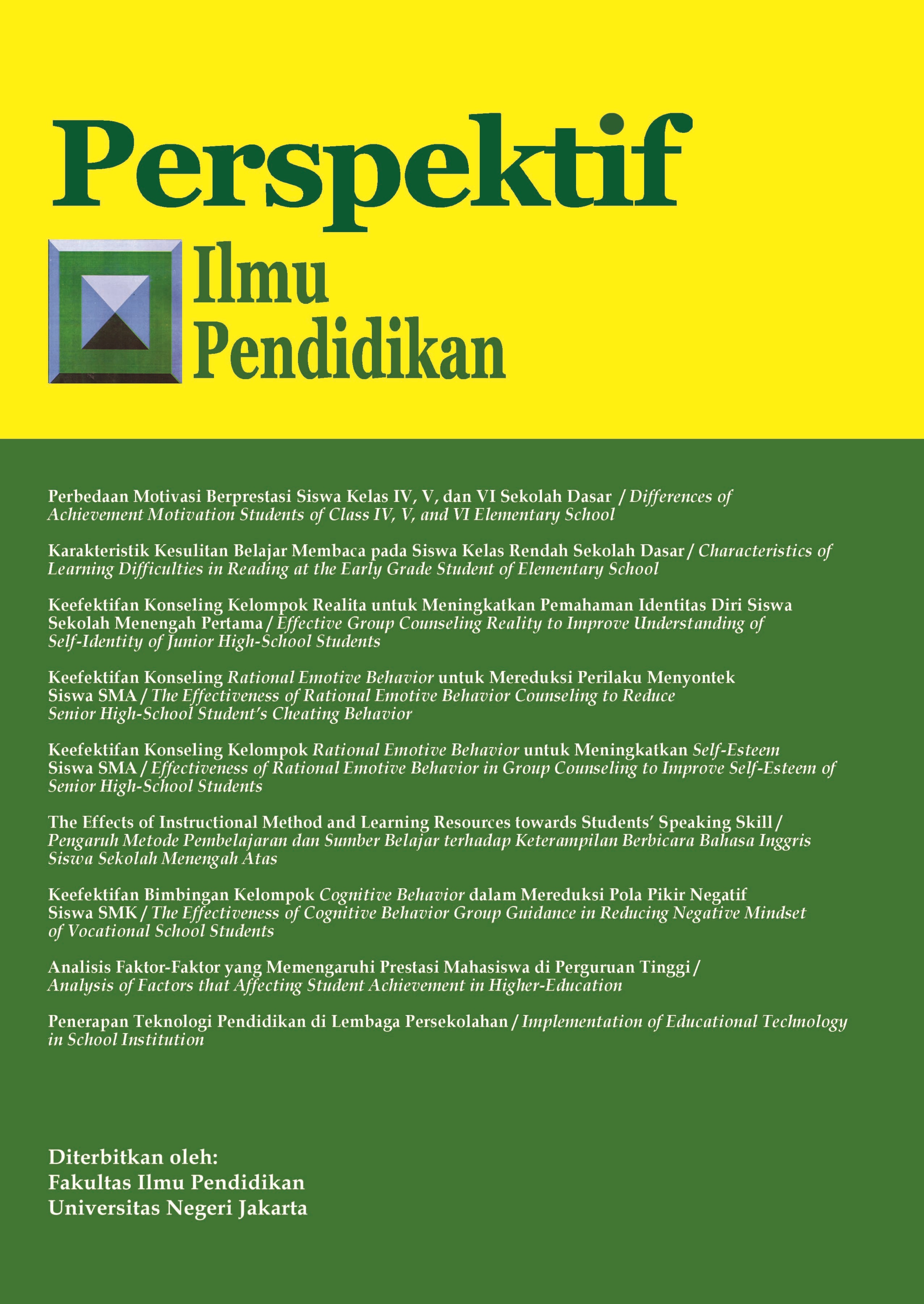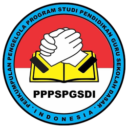KEEFEKTIFAN KONSELING KELOMPOK RATIONAL EMOTIVE BEHAVIOR UNTUK MENINGKATKAN SELF ESTEEM SISWA SMA
DOI:
https://doi.org/10.21009/PIP.322.5Keywords:
rational emotive behavior groups counseling, self-esteem, senior high-school studentsAbstract
Self-esteem is an individual assessment that leads to self-evaluation of the results achieved, which are influenced by attitudes, interactions, rewards, and acceptance of others towards the individual. To measure self-esteem in this study using a questionnaire of self-esteem that has a value of total item validity with an R-value of 0.220, and reliability of 0.945, it can be concluded that the questionnaire is reliable and feasible to use as a research instrument. This study aims to determine the effectiveness of the rational emotive behavior group counseling to improve self-esteem of high-school students. This type of research is quantitative with the design of Experiment Pretest and Posttest Control Group Design. Data were analyzed by two nonparametric statistical test`s Independent Mann-Whitney U Sample Test. The results of the hypothesis obtained by the Z value of -2.120 and Asymp numbers. Sig. (2-tailed) which is 0.034, which meant it is smaller than the real level (α / 2 = 0.05), then Ho is rejected, meaning that the counseling of rational emotive behavior groups is effective to improve self-esteem of high-school students. The research was carried out starting from February to July 2018, which took place at SMA Negeri 1 Kutorejo. Based on the results of the research, researchers give suggestions for (1) teacher of Counseling Guidance could apply this rational emotive behavior group counseling as an alternative strategy to improve students’ self-esteem; (2) furthermore, researcher could apply rational emotive behavior counseling on the other psychological aspects or using different techniques for group counseling, so they could learn new knowledge.
References
Coopersmith, S. (1967). Antecedents of self esteem. San Fransisco: W.H. Freeman and Company.
Corey, G. (2013). Teori dan praktik konseling dan psikoterapi. Bandung: PT Refika Aditama.
Geldrad, K., & Geldrad, D. (2011). Konseling keluarga. Yogyakarta: Pustaka Pelajar.
Habsy. (2014). Keefektifan konseling kelompok untuk meningkatkan harga diri siswa SMK. Tesis tidak diterbitkan. Malang: PPs UM.
Habsy, B. A. (2017a). Model konseling kelompok cognitive behavior untuk meningkatkan self esteem siswa SMK. Perspektif Ilmu Pendidikan, 31(1), 21-35. doi: https://doi.org/10.21009/PIP.311.4
Habsy, B. A. (2017b). Filosofi ilmu bimbingan dan konseling Indonesia. Jurnal Pendidikan (Teori dan Praktik), 2(1), 1-11. doi: http://dx.doi.org/10.26740/jp.v2n1.p1-11
Habsy, B. A. (2018a). Konseling rasional emotif perilaku: Sebuah tinjauan filosofis. Indonesian Journal of Educational Counseling, 2(1), 13-30. doi: https://doi.org/10.30653/001.201821.25
Habsy, B. A. (2018b). Model bimbingan kelompok PPPM untuk mengembangkan pikiran rasional korban bullying siswa SMK etnis Jawa. Jurnal Pendidikan (Teori dan Praktik), 2(2), 91-99. doi: http://dx.doi.org/10.26740/jp.v2n2.p91-99
Hasibuan, R.L. & Wulandari, L.H. (2016). Efektivitas rational emotive behavior therapy (REBT) untuk meningkatkan self esteem pada siswa SMP korban bullying. Jurnal Psikologi, 11, 103-110.
Ikbal, M. & Nurjannah, N. (2016). Meningkatkan self esteem dengan menggunakan pendekatan rational emotive behavior therapy pada peserta didik kelas VIII di SMP Muhammadiyah Jati Agung Lampung Selatan tahun pelajaran 2015/2016. Jurnal Bimbingan dan Konseling, 3(1), 33-46. doi: http://dx.doi.org/10.24042/kons.v3i1.556
Jones, N. (2011). Teori dan praktik konseling dan terapi. Yogyakarta: Pustaka Pelajar.
Kumalasari, G., Eka, W., & Karsih. (2011). Teori dan teknik konseling. Jakarta: PT Indeks.
Maynawati, A. F. R. (2012). Penanganan kasus low self-esteem dalam berinteraksi sosial melalui konseling rational emotif teknik reframing. Indonesian Journal of Guidance and Counseling: Theory and Application, 1(1). 15-22.
Nursalim, M., & Suradi, S. A. (2002). Layanan bimbingan dan konseling. Surabaya: UNESA University Press.
Sari, E. K. W., & Soejanto, L. T. (2016). Keefektifan konseling kelompok REBT untuk meningkatkan self esteem mahasiswa. JKI (Jurnal Konseling Indonesia), 1(2), 101-106. http://ejournal.unikama.ac.id/index.php/JKI/article/view/1622
Suhron, M. (2016). Asuhan keperawatan konsep diri: Self esteem. Ponorogo: UMPO Press.
Sukmadinata, N. S. (2003). Landasan psikologi proses pendidikan. Bandung: Remaja Rosdakarya.
Young, G. G. (2012). Membaca kepribadian orang. Yogyakarta: Diva Press.
Downloads
Published
How to Cite
Issue
Section
License
Authors who publish with this Journal agree to the following terms:
- Author retain copyright and grant the journal right of first publication with the work simultaneously licensed under a creative commons attribution licensethat allow others to share the work within an acknowledgement of the work’s authorship and initial publication of this journal.
- Authors are able to enter into separate, additional contractual arrangementfor the non-exclusive distribution of the journal’s published version of the work (e.g. acknowledgement of its initial publication in this journal).
- Authors are permitted and encouraged to post their work online(e.g. in institutional repositories or on their websites) prior to and during the submission process, as it can lead to productive exchanges, as well as earlier and greater citation of published works.
-
Users/public use of this website will be licensed to CC BY-NC-SA Creative Commons Attribution-NonCommercial-ShareAlike 4.0 International License












